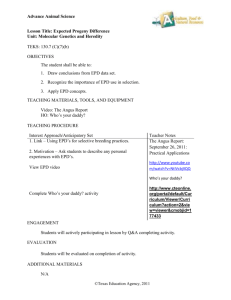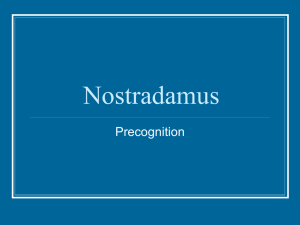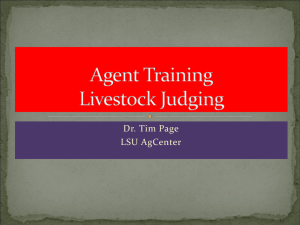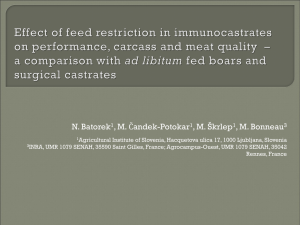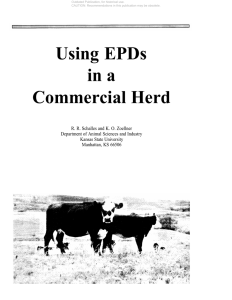PowerPoint format
advertisement
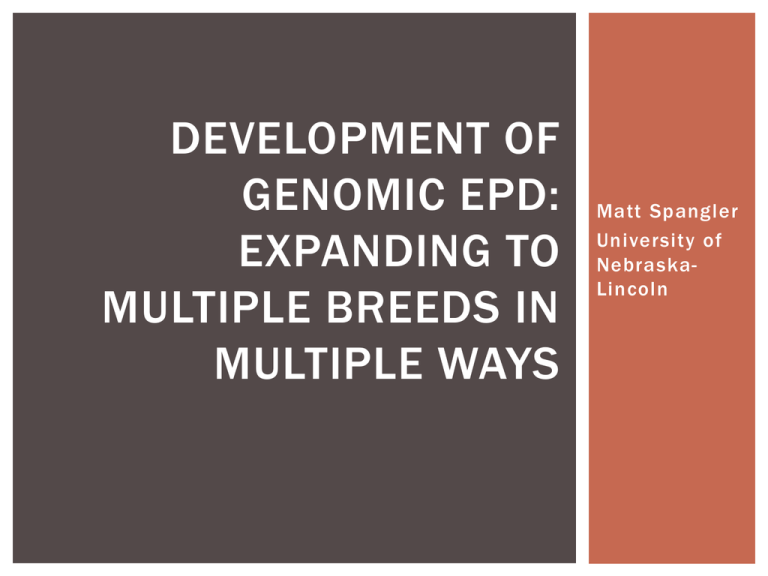
DEVELOPMENT OF GENOMIC EPD: EXPANDING TO MULTIPLE BREEDS IN MULTIPLE WAYS Matt Spangler University of NebraskaLincoln ADOPTION OF GENOMIC PREDICTIONS AAA, ASA , AHA , NALF with others quickly following Ef ficacy of this technology is not binary The adoption of this must be centered on the gain in EPD accuracy This is related to the proportion of genetic variation explained by a Molecular Breeding Values (MBV; Result of DNA Test) % GV = squared genetic correlation “DISCOVERING” MARKER EFFECTS “TRAINING” GENOMIC PREDICTIONS Using populations that have phenotypes and are genotyped Vector of y can be deregressed EBV or adjusted phenotypes. Estimate SNP effects. PROCESS Training/Discovery-NBCEC Training Evaluation Marker Effects s MBV = å x ibˆ i i=1 FOUR GENERAL APPROACHES TO INCORPORATION Molecular information can be included in NCE in 4 ways: Correlated trait Method adopted by AAA Similar to how ultrasound and carcass data are run “Blending” This is developing an index of MBV and EPD Method of AHA—Post Evaluation Treating as an external EPD What ASA currently does Likely RAAA and NALF Allows individual MBV accuracies Genomic relationship Must have access to genotypes Dairy Industry Some swine companies WHY DIFFERENT APPROACHES? Make integration of genomic information fit the current NCE system/provider. CURRENT ANGUS PANELS Trait Igenity (Neogen) (384SNP) Pfizer (50KSNP) Calving Ease Direct 0.47 0.33 Birth Weight 0.57 0.51 Weaning Weight 0.45 0.52 Yearling Weight 0.34 0.64 Dry Matter Intake 0.45 0.65 Yearling Height 0.38 0.63 Yearling Scrotal 0.35 0.65 Docility 0.29 0.60 Milk 0.24 0.32 Mature Weight 0.53 0.58 Mature Height 0.56 0.56 Carcass Weight 0.54 0.48 Carcass Marbling 0.65 0.57 Carcass Rib 0.58 0.60 Carcass Fat 0.50 0.56 SIMMENTAL BASED PREDICTIONS NBCEC (2,800 TRAINING ANIMALS) Trait rg ASA CE 0.45 BW 0.65 WW 0.52 YW 0.45 MILK 0.34 MCE 0.32 STAY 0.58 CW 0.59 MARB 0.63 REA 0.59 BF 0.29 SF 0.53 BREEDS WORKING TOWARDS 50K PREDICTIONS VIA THE NBCEC Breed No. of Training Records Hereford 1,725 Red Angus 296 Simmental 2,853 Brangus 896 Limousin 2,319 Gelbvieh 847 Maine Anjou 115 NBCEC RESULTS Angus 3,500 Hereford 800 Gelbvieh 847 Gelbvieh + Angus (1,181) BW 0.64 0.43 0.38 0.41 WW 0.67 0.32 0.31 0.34 YW 0.75 0.30 0.21 NC MILK 0.51 0.22 0.36 0.34 FAT 0.70 0.40 NA NA REA 0.75 0.36 0.38 0.48 MARB 0.80 0.27 0.54 0.56 CED 0.69 0.43 NC 0.48 CEM 0.73 0.18 NC NC SC 0.71 0.28 0.50 0.50 IMPACT ON ACCURACY--%GV=10% IMPACT ON ACCURACY--%GV=40% WHY A SHIFT AWAY FROM COMMERCIAL PRODUCTS? Decreased cost of the technology 50K ~$85 770K~$185 Flexibility “Control your own destiny” Can alter integration methods WILL GENOMICS ENABLE SELECTION FOR… Densely recorded traits Yes, for low accuracy animals that are “closely” related to training Sparsely recorded traits Not as much Traits where we have “uncertainty” around the phenotype that is recorded Poor phenotype recording Junk in, Junk out Always check for reasonableness!! WHY DIDN’T WE START WITH TRAITS THAT ARE SPARSELY RECORDED? Phenotypes do not exist or are very sparse Discovery Target Validation WHY BREED-SPECIFIC MBV? (KACHMAN ET AL., 2012) Breed WW YW AN 0.36 (0.07) 0.51 (0.07) AR 0.16 (0.16) 0.08 (0.18) ACROSS BREED PREDICTIONS POOLED TRAINING DATA FOR REA If breeds are contained in training, predictions work well If not, correlations decrease Pooled Training (AN, SM, HH, LM) AN 0.43 (0.07) SM 0.34 (0.09) HH 0.33 (0.08) GV 0.17 (0.11) IS YOUR BREED READY FOR GENOMICS? Implement “strategic phenotyping”? Ready to Retrain? Relationship to training population is important Imputation 50K or HD quality at Walmart prices? LD Panels Maybe not that simple Sequence Data How to use? Screening of bulls for genetic defects? Will there be such a thing as a “non-carrier” bull? SUMMARY Phenotypes are still critical to collect Methods for lower cost genotyping are evolving Breeds must build training populations to capitalize Genomic information has the potential to increase accuracy Proportional to %GV Impacts inversely related to EPD accuracy Multiple trait selection is critical and could become more cumbersome Economic indexes help alleviate this Adoption in the beef industry is problematic ~30% of cows in herds with < 50 cows Adoption must start at nucleus level BEEF INDUSTRY HAS TO BECOME MORE SOPHISTICATED!
